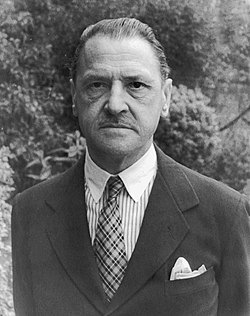William Somerset Maugham Quote
Philip exulted, as he had exulted in his boyhood when the weight of a belief in God was lifted from his shoulders: it seemed to him that the last burden of responsibility was taken from him; and for the first time he was utterly free. His insignificance was turned to power, and he felt himself suddenly equal with the cruel fate which had seemed to persecute him; for, if life was meaningless, the world was robbed of its cruelty. What he did or left undone did not matter. Failure was unimportant and success amounted to nothing. He was the most inconsiderate creature in that swarming mass of mankind which for a brief space occupied the surface of the earth; and he was almighty because he had wrenched from chaos the secret of its nothingness. Thoughts came tumbling over one another in Philip’s eager fancy, and he took long breaths of joyous satisfaction. He felt inclined to leap and sing. He had not been so happy for months.
Philip exulted, as he had exulted in his boyhood when the weight of a belief in God was lifted from his shoulders: it seemed to him that the last burden of responsibility was taken from him; and for the first time he was utterly free. His insignificance was turned to power, and he felt himself suddenly equal with the cruel fate which had seemed to persecute him; for, if life was meaningless, the world was robbed of its cruelty. What he did or left undone did not matter. Failure was unimportant and success amounted to nothing. He was the most inconsiderate creature in that swarming mass of mankind which for a brief space occupied the surface of the earth; and he was almighty because he had wrenched from chaos the secret of its nothingness. Thoughts came tumbling over one another in Philip’s eager fancy, and he took long breaths of joyous satisfaction. He felt inclined to leap and sing. He had not been so happy for months.
Related Quotes
About William Somerset Maugham
Maugham's novels after Liza of Lambeth include Of Human Bondage (1915), The Moon and Sixpence (1919), The Painted Veil (1925), Cakes and Ale (1930) and The Razor's Edge (1944). His short stories were published in collections such as The Casuarina Tree (1926) and The Mixture as Before (1940); many of them have been adapted for radio, cinema and television. His great popularity and prodigious sales provoked adverse reactions from highbrow critics, many of whom sought to belittle him as merely competent. More recent assessments generally rank Of Human Bondage – a book with a large autobiographical element – as a masterpiece, and his short stories are widely held in high critical regard. Maugham's plain prose style became known for its lucidity, but his reliance on clichés attracted adverse critical comment.
During the First World War Maugham worked for the British Secret Service, later drawing on his experiences for stories published in the 1920s. Although primarily homosexual, he attempted to conform to some extent with the norms of his day. After a three-year affair with Syrie Wellcome which produced their daughter, Liza, they married in 1917. The marriage lasted for twelve years, but before, during and after it, Maugham's principal partner was a younger man, Gerald Haxton. Together they made extended visits to Asia, the South Seas and other destinations; Maugham gathered material for his fiction wherever they went. They lived together in the French Riviera, where Maugham entertained lavishly. After Haxton's death in 1944, Alan Searle became Maugham's secretary-companion for the rest of the author's life. Maugham gave up writing novels shortly after the Second World War, and his last years were marred by senility. He died at the age of 91.
